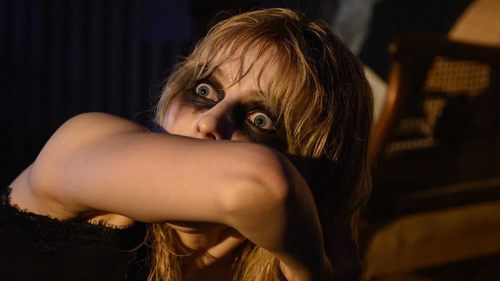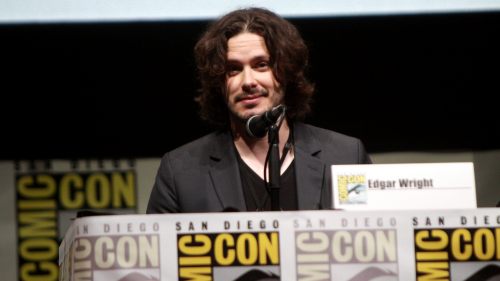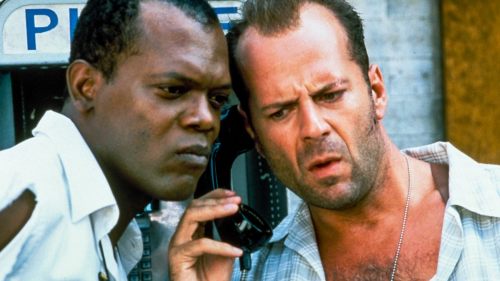Judge Judy And Executioner: Edgar Wright’s HOT FUZZ Turns Ten
Ever since he was fourteen, Edgar Wright’s been making films. His father bought a Super 8mm camera, and Wright would direct his friends after class in what he’s often referred to as his “mini-epics”. Wright’s first finished fifteen-minute flicker was Rolf Harris Saves the World, in which the iconic Australian entertainer battles international terrorists. The kid would project the picture on lunch breaks at school and charge 50p for admission. Even while he was growing up, the writer/director displayed a propensity for transmuting the things that entertained him into personal pieces of expression, yearning to amuse anyone who would buy a ticket.
Not much has changed in the years since, as Wright parlayed this juvenile fascination into an adult career, adapting one of these amateur filmic endeavors, A Fistful of Fingers, into a 16mm feature. Shot in twenty days and financed via local businesses, Fingers is a comedic Western that draws inspiration from Sergio Leone, following Clint Eastwood stand-in Walter Marshall (Graham Low), who sports a crafty Native American sidekick (Martin Curtis), and shows down with shameful gunslinger, The Squint (Oli van der Vijer). There’s even some Monty Python-esque nun puns (as one character shouts “nun shall pass!”) and an emotional musical ballad titled “When A Man Loves a Horse.” Though the filmmaking is rough, Fingers fully owns Wright’s unique sense of humor, and earned him a spot on Matt Lucas and David Walliams’ sketch television program, Mash & Peas.
During his time working in TV, Wright saw Simon Pegg do a set of stand-up comedy and knew the two were destined to work together. After acting with Jessica Stevenson (now Jessica Hynes) on Asylum (with Wright contributing behind the scenes), Pegg and his co-star insisted that Edgar direct a project they were writing for themselves. The result was Spaced – a generational manifesto that hoped to speak to the very same twenty-something slackers they were depicting. At that time, many UK sitcoms were crafted by creatives who were much older than their target audiences. Spaced sought to change that, becoming a Gen-X staple of hilarious nerdery.
Spaced’s style – a mish-mash of pulp culture and geek cinephile references made amongst a house occupied by aloof North Londoners – begat Shaun of the Dead, Wright’s first studio feature. A horror/comedy that worked its influences into the text, Shaun still strove to deliver genuine zombie dread. Co-written by Pegg and Wright, the movie became an instant classic, as it re-teamed Simon with his Spaced bestie, Nick Frost (who trades doofy unhinged fanboy, Mike, for doofy worthless fanboy, Ed) in a cheeky battle against the undead. Nods to Lucio Fulci and George A. Romero abound, as Pegg and Frost elevate their effortlessly likable loafer personas into an onscreen bond that rivals Laurel & Hardy. Shaun of the Dead is a beautiful film that uses a recognizable construct to smuggle in astute observations regarding responsibility and friendship. To wit, it was a pitch perfect crystallization of Wright’s talents up to that point.
So how does one attempt to top a peer-defining piece of genre filmmaking? By jumping categorizations and mastering another favorite mode of entertainment, of course. The second film in Wright, Pegg and Frost’s Three Flavours Cornetto Trilogy (or “Blood and Ice Cream Trilogy,” if you nasty) that began with Shaun of the Dead and would conclude with The World's End, Hot Fuzz is the action movie middle chapter in this coming of age triptych. Applying the glossy aesthetic of bullet fest auteurs such Kathryn Bigelow and Michael Bay to a distinctly English environment, Fuzz sees Simon Pegg finally getting his act together as Police Constable Nicholas Angel, noted super cop and master in advanced driving and cycling. Angel is a by-the-book bobby who’s making the rest of his colleagues look bad by being so damn good at his job. In retaliation, the Chief Inspector (Bill Nighy, reuniting for a cameo with his Shaun cohorts) promotes and ships him off to Sandford, Gloucestershire – the sleepy village antithesis of the big city beat he so proudly walks. The new Sergeant doesn’t want the assignment, but being the consummate company man means he accepts it with a clenched jaw and an arm snugly wrapped around his prized Japanese peace lily.
The most prominent shift Spaced and Shaun diehards pick up on in the first five minutes is the fact that Pegg’s all grown up. No longer banging away at a video game controller or working at the local electronics shop, Angel’s a tactical member of society. Straight-laced and unable to keep a romantic relationship due to his marriage to the job, he’s a cliché ripped straight from the center of numerous '80s/'90s cop pictures, now mostly attempting to keep the kids from drinking underage at the local pub. Pegg’s flexing a set of comedic muscles we hadn’t seen up to this point, and while even his laziest characters have always played a bit straighter next to Frost, with Angel it’s a complete transformation from posture to phraseology. The stiffness highlights just how razor sharp his timing is, ping-ponging off the rapid-fire succession of goofballs Hot Fuzz fires at him. It’s a revelatory performance, bolstered by an injection of physicality the actor’s called upon to display during the film’s geriatric Wild Bunch climax.
Sticking to his usual script is Nick Frost as PC Danny Butterman, the son of Sanford’s Inspector (Jim Broadbent) and all-around sloppy, drunken knucklehead (Frost wouldn’t finally break free from this mold until The World’s End). Like Mike or Ed, Danny is also a fanboy, only his slavish devotion to the action cinema canon has caused him to try and replicate the movements of marquee Gods in the real world, while simultaneously following in his father’s policeman footsteps. However, the job didn’t turn out to be the crazed two-gun fiesta Bad Boys II and Point Break promised, especially in Sanford. Now Danny’s stuck wishing that he was anywhere but here, chasing down bad guys and getting into car chases only when he lays his head down on a pillow. When Angel arrives, PC Butterman is instantly smitten, following the Sergeant around like a puppy whilst asking if he’s ever jumped through the air while discharging his firearm. Danny has a tangible idol now, and he’s going to soak up all of Angel’s ability and knowledge through osmosis, if need be.
The bond between Nicholas and Danny is a rather clever alteration of the homoeroticism commonly found inside the action genre (half of Michael Mann’s filmography is about men wanting to lay their weapons down with one another). Nicholas can’t love a woman the same way he does his career, and Danny has never found solace in anything but shoot ‘em ups since his mum passed away when he was a lad. After Danny breaks down Angel’s wall of rigidity, the two are inseparable platonic pals, throwing sleepover movie parties that’re drenched in beer. The chemistry between the two actors has never been better. At times, the late-night heart-to-hearts transcend simple performance and shine a light onto a creative partnership that’s special because it isn’t an intellectual act, but rather an exploration of genuine affection for one another. All that’s missing is Danny rescuing Nicholas from a toilet bomb for them to go full Riggs and Murtaugh.
This friendship develops in a sea of misfits, as Sanford’s teeming with colorful eccentrics, most of whom work on the force. Looking to steal the show completely are “the Andys” – Cartwright (Rafe Spall) and Wainwright (Paddy Considine). A pair of foul mouthed Sanford dicks whose mustaches are even more ridiculous than the bullshit they spout, Spall and Considine have a hard-boiled Rosencrantz and Guildenstern vibe going on, entering each scene with a torrent of profanity and distracting Angel from possible nefarious goings-on that are troubling the town. It’s an amazing pairing, cloaked in a haze of cigarette smoke and stinking of pulled pints, their resentment for Angel’s every existence is palpable as they guffaw at his and Danny’s budding love.
Much like he would with Baby Driver (which plays like a Walter Hill greatest hits record), Wright is recklessly sampling and remixing action cinema grammar. Tony Scott’s wanton shutter speed and film stock abuse are applied to paperwork montages. Jess Hall’s wide 2.35 frame glides across both the Sanford police station like it’s the towering set from Beverly Hills Cop II, and a shootout in the village commons with equal fascination. Wright’s keen ear for pop music (which is still present, acting like a jukebox Greek chorus) gets out of the way long enough for him to drop a needle on a trailer track from Lethal Weapon 3. Even Timothy Dalton’s casting as the dastardly slasher of grocery store prices, Simon Skinner, feels like a metatextual nod to both Bond and the way the Broccolis chased the popular trends within the five decades their series spans. Dalton’s turn as 007 in The Living Daylights and Licence to Kill were aiming to please fans of the muscle-headed '80s massacre hours Danny no doubt watches time and again. The layers of referential reverence Wright layers into this love letter are a joy to peel back over multiple viewings, often just as clever as any of the (admittedly wonderful) jokes his and Pegg’s script contains.
Nevertheless, it’s not all large-caliber veneration, as Wright cannot fully shed his horror filmmaker skin. Angel and Danny become embroiled in an investigation revolving around a series of seemingly connected “accidents” that blow one man’s tacky mansion sky high and split another’s head via an old stone structure. But Angel knows these aren’t coincidences, and tracks down a nefarious cult that operates within Sanford (the NWA: “Neighborhood Watch Alliance”). It’s a combination of slasher film gore fountains and British folk horror that would impress Christopher Lee. But Wright is smart enough to know that these elements are accents to his action film whole, as the shady whodunit culminates in a colossal finale where seemingly every citizen of this countryside village is packing heat. Wright throws all caution to the wind, showing off the fact that he’s a keen set-piece study, spraying these quaint cottages with hollow point rain showers. It’s a glorious stretch where parody becomes just as good (if not better) than 99% of the real thing, while still retaining the auteur’s wry sense of humor.
Is Hot Fuzz Edgar Wright’s best movie? Hard to say, as he’s never made a motion picture qualitatively below “excellent,” and arguably has four bona fide masterpieces to his name. Is Hot Fuzz the best Cornetto entry? Equally difficult to decipher, as the initial entry is a modern genre touchstone, and its successors only strengthen the trilogy’s themes regarding growing up by further expounding upon them (with World's End acting as an organic thesis about entering responsible middle age). What’s indisputable is that Hot Fuzz ostensibly acts as the culmination of what Edgar Wright began with Rolf Harris Saves the World, as he’s still the same kid with a camera, paying homage to his personal favorites while retaining a unique point of view. With each movie, he keeps getting better and better, but the fireworks that conclude Hot Fuzz reveal a clean sense of geography, choreography and locomotive editing that’s thrilling and revelatory when placed in context with the rest of his filmography. To put it in Danny Butterman’s parlance: shit got real, motherfuckers. Here come the Fuzz.



